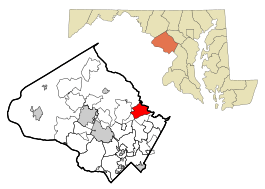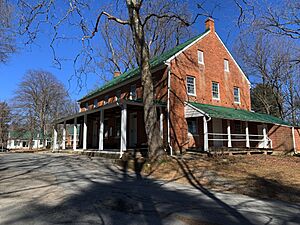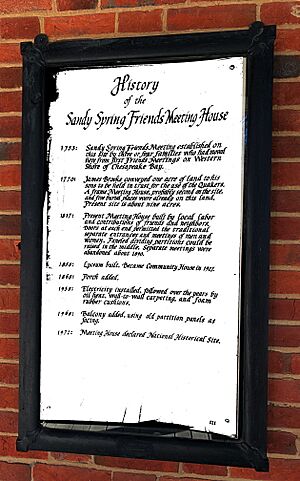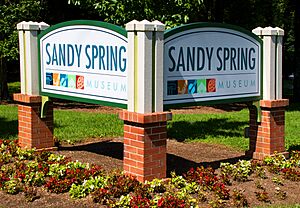Sandy Spring, Maryland facts for kids
Sandy Spring is a community in Montgomery County, Maryland, United States. It's a place that isn't officially a city or town.
Quick facts for kids
Sandy Spring
|
|
|---|---|

Location in the U.S. state of Maryland
|
|
| Country | |
| State | |
| County | |
| Settled | ca. 1715 |
| Time zone | UTC-5 (EST) |
| • Summer (DST) | UTC-4 (EDT) |
| ZIP code |
20860
|
| Area codes | 301, 240 |
Contents
Geography of Sandy Spring
Sandy Spring is located in Montgomery County. Its borders are roughly Brooke Road and Dr. Bird Road to the north and west. Ednor Road is to the south, and New Hampshire Avenue is to the east.
The United States Census Bureau groups Sandy Spring with Ashton. Together, they form a special area called Ashton-Sandy Spring. This is how they count people for official records.
History of Sandy Spring
The community of Sandy Spring was started by Quakers. They arrived in the early 1700s. They were looking for land to grow crops like tobacco and corn.
Early Land Owners
One of the first landowners was Richard Snowden. He bought 1,000 acres of land in 1715. This land was called "Snowden's Manor." He bought more land over time. By 1743, his property was over 9,000 acres.
Another important landowner was Major John Bradford. He owned over 2,000 acres. This included land called "Charley Forest." Later, James Brooke, who was Richard Snowden's son-in-law, bought much of this land. By the 1760s, he owned over 22,000 acres.
Quaker Community Life
The Quakers first started worshiping here around 1753. They built their current brick meeting house in 1817. It replaced an older wooden one from 1770. The community is named after a fresh-water spring nearby. This spring gave the area its name.
The meeting house helped define the area of Sandy Spring. It included places where members could travel to and from the meeting house in one day. This included communities like Brookeville, Olney, and Brighton.
Schools and Organizations
In the late 1800s, a local school called Sherwood Academy started. In 1906, it became Sherwood High School. This was the third public high school in the county.
A Quaker school, Sandy Spring Friends School, opened in 1961. In 1967, a retirement community for Quakers, Friends House, was built next to the school. The Sandy Spring Library opened in 1842. The Farmer's Club of Sandy Spring started in 1844. They met to talk about better ways to farm.
A study in 1901 showed that many residents were descendants of free Black families. Their families had lived there for over 125 years.
Important People of Sandy Spring
Benjamin Hallowell's Contributions
Benjamin Hallowell (1799–1887) was a well-known Quaker. He was an educator in the 1800s. He taught in Olney and Virginia. He was briefly the first president of the Maryland Agricultural College. This college later became the University of Maryland. He helped start the Sandy Spring Farmer's Club. He also helped create the Mutual Fire Insurance Company.
Dr. Bird's Medical Legacy
Dr Jacob Wheeler Bird was born in 1885. He studied at St. John's College. He earned his medical degree in 1907.
In 1909, Dr. Bird moved to Sandy Spring. He started his medical practice on the road now named Dr. Bird Road. He also opened the first hospital in Montgomery County. It is now called Montgomery General Hospital.
Dr. Bird worked for fifty years. He made house calls to his patients. At first, he used a horse-drawn buggy. Later, he used a car. He founded Montgomery General Hospital in February 1920. Dr. Bird and his wife passed away in a car accident in 1959.
Sandy Spring Museum
The Sandy Spring Museum was started in 1980 by Delmas Wood. He was an insurance salesman. He wanted to save Sandy Spring's history. He felt it was being lost as older residents passed away. Wood wanted a place to keep old furniture, farm tools, photos, and documents. Florence Virginia Barrett Lehman also helped start the museum.
The museum first opened in the basement of a bank in Olney. In 1986, it moved to a large brick house called Tall Timbers. This house belonged to Gladys Brooke Tumbleson. She was from the Brooke family, who the nearby town of Brookeville is named after. She sold the house to the museum for a low price.
In 1994, Helen Bentley gave 7.5 acres of land to the museum. The museum's new building opened in 1997. This gave them more space for exhibits. In 2007, an addition was built. It added a research library and a storage area for the museum's collections.




